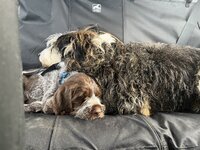That's pretty funny! My wife hates my bearded dogs. They make awful messes when they drink.
Ha, you get used to wondering what you've stepped in and just assume that it is beard slime from the monster drinking.
That's pretty funny! My wife hates my bearded dogs. They make awful messes when they drink.
Thank you very much for this. On the farm when I let him out to run with his collar on I let him go crazy, but when we're actually on a training run I try very hard to consistently use "no bird!" command on the little birds. Just trying to make sure i'm not letting bad habits get established and at the same time not staunching his drive (not that I think that's even possible, wow!).It just comes with time and birds. It's a prey drive thing. I let my pups chase them all, it's part of the learning process. Remember the first year is for them, every year after that is for you. It's all about time in the field and all those little and big birds just reinforce he can't catch them. Curtailing drive at a young age can have catastrophic effects once you start the training process later.
Why did you stop breeding? Any breeders you recommend?
Thank you very much for this. On the farm when I let him out to run with his collar on I let him go crazy, but when we're actually on a training run I try very hard to consistently use "no bird!" command on the little birds. Just trying to make sure i'm not letting bad habits get established and at the same time not staunching his drive (not that I think that's even possible, wow!).
Again, thank you very much for the advice. My retired GR was an amazing bird dog and he reacted completely opposite to Oscar. I agree 100% that training a retriever vs. a WPG is night and day.My only advice is let him learn on his own. A pointing dog is not a retriever. Training a retriever is all about control and basically dictating every move they do in the field. Pointing dogs come out of the with box knowing how to hunt it's more of a guiding thing to hone their skills. My 15 month old and my 14 year old, chased every tweetie bird, hawk, crow for a long time. It all clicked bird hunting and they could care less about them now. Once they figure out they can't catch birds, they'll start pointing on their own and then you can start the whoa breaking process. I wouldn't recommend breaking a dog until they're mature enough, usually 16 months old. Any negative connotation with birds can lead to blinking birds and other really hard habits to break.
I take a pretty soft hand with my dogs the first year. I only potty train them, here on a reward basis until their 8 or 9 months old (then I collar condition them), kennel train them, load up, and that's about it. I don't care if a dog sits (in fact it can create problems when you start applying pressure during whoa training as it becomes a default when the pressure steps up) I don't care if they heel, and if they're out of the house we're in the field or training most of the time. It's easy to reign them in, hard to push them out.
I sent you a PMSimple answer is that our dogs just got older.
The last litter from our dam Maggie was one single pup. Her first two were a combined twenty.
I suspect the lone pup thing was because she had been kicked by an angus cow and she wasn't right after that. Living in this country has its perils.
After both our breeding parents died in March '17 we stepped back for a breather.
Everyone here knows that dogs = dedication and work, griffs especially, given that they are so full of life and social. We aren't concrete kennel people, our dogs live with us.
As Goviator above just alluded: Griffs have no place in a concrete kennel full time--to each his own.
As for a breeder, personally I'd recommend the guy I just bought from. His pups look to have all the right stuff and he's a hunter, his dogs aren't bookmarks. He's out of Idaho Falls, I'll PM his details to you if you'd like.

Yep, that’s what we did. Just trying for an example of how to correct negative behavior.Put the cat food where he can't get at it and remove the temptation..
Sent from my SM-G991U using Tapatalk
A good way to correct a behavior your dont like is either to prevent it completely, or catch it in the act and replace it with a desired behavior.Yep, that’s what we did. Just trying for an example of how to correct negative behavior.
